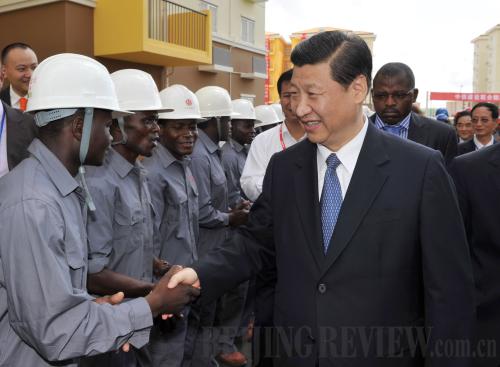|
 |
|
GOOD JOB: Chinese Vice President Xi Jinping greets local workers at a project undertaken by China's CITIC Construction Co. Ltd. in Angola on November 20 (HUANG JINGWEN) |
In recent years, China and Africa have fostered a strategic partnership through enhanced cooperation in political, economic, social and cultural areas. After Chinese Vice President Xi Jinping's visit to three countries in southern Africa—South Africa, Angola and Botswana—in-mid November, analysts believe the bilateral relationship will now enter a new phase of development.
The vice president's African trip shows the value China places on Sino-African ties. His visit will further the "new-type strategic partnership" between the two sides following the recent global economic downturn, He Wenping, a research fellow with the Chinese Academy of Social Sciences, told Beijing Review.
China is acutely aware it is a developing country and that South-South cooperation is at the core of Chinese diplomacy, she said.
A fruitful trip
In South Africa, the two sides signed four cooperative documents concerning energy cooperation, financial supervision and trade statistical analysis.
South African President Jacob Zuma paid a four-day state visit to China in August this year. During his visit, the two sides upgraded their bilateral relationship to a "comprehensive strategic partnership," marking a new phase in the China-South Africa relationship. Xi's visit was, on some level, in response to Zuma's visit. Besides, the visit also cemented bilateral political, economic, cultural and security cooperation, said He.
Li Wentao from the China Institutes of Contemporary International Relations (CICIR) said Xi's visit to Angola helped create a solid base for a comprehensive relationship by strengthening bilateral relations in various fields.
Since 2006, Angola has been China's top trading partner in Africa. During Xi's visit, China and Angola signed seven agreements on economic, technological, energy, mining, agricultural and financial cooperation, and issued a joint statement establishing a strategic partnership.
Likewise, China and Botswana signed three cooperative agreements on infrastructure construction, energy and assistance, including 40 million yuan ($6.02 million) of non-reimbursable assistance.
Xi also called for concerted efforts to strengthen the Forum on China-Africa Cooperation (FOCAC) and to boost the development of a new type of China-Africa strategic partnership.
Launched in 2000, the FOCAC is a platform for collective consultation and dialogue between China and African states. Addressing a seminar marking the 10th anniversary of the establishment of the FOCAC, Xi proposed stronger strategic planning, practical cooperation and institution building of the FOCAC so as to make it a solid base for political trust, a major engine driving common development and an efficient and mature platform for China-Africa cooperation.
Xi said that China and African countries will continue to respect, trust and support each other and treat each other as equals. The two sides should have closer dialogue and consultation within the FOCAC framework, enhance coordination and cooperation on global issues of mutual interest, strive to increase the say and representation of developing countries in the international system and ensure better development of both China and Africa.
| 